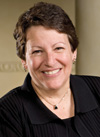 Wisconsin
Lawyer
Wisconsin
Lawyer
Vol. 81, No. 10, October
2008
President's Message
Topless meetings?
Unlike some organizations that are
going "topless" to prohibit laptops and BlackBerrys in
meetings, the State Bar Executive Committee is experimenting
with receiving and reviewing all meeting materials electronically and
so is inviting participants to bring their laptops to meetings.
 by Diane S.
Diel
by Diane S.
Diel
"Go topless to meetings to keep meeting short" was a recent
headline on my Internet
start page. Sure, I thought, but has business casual really gone that
far? Well, it turned
out that "topless" meant laptop- and
BlackBerry®-less. The point of the topless meetings
is undeniably reasonable - to keep attendees focused on the meeting and
shorten the
meetings. We've all seen the BlackBerry pose: The individual focused and
quiet, intent,
eyes down, hands off the table, but fingers and thumbs busy while
scrolling through
email. Recently, a possibly apocryphal story from Milwaukee County
featured a trial lawyer
observed in a contested hearing, replying to email via BlackBerry.
Against the topless trend, the members of the State Bar
Executive Committee have
been encouraged to bring laptops to committee meetings. The committee
voted in August to
experiment with receiving and reviewing all meeting materials
electronically for at
least the next several meetings. The State Bar has the technology to
electronically post
or email committee meeting materials. The biggest concern for some
members, including
me, will be ease of electronic review and retrieval of the materials.
Another issue is
whether we will be distracted by the Internet or email.
Many articles discuss the topic of etiquette for the use of
electronics during
meetings. Advocates for the use of laptops during meetings say that the
laptop or
BlackBerry keeps the meeting rolling because no one needs to interrupt
the meeting to take a call
or relay messages to the outer world, such as sending a message saying
something like
"still in meeting will be late." Some articles detail
appropriate rules for business text
messages. Under these rules, it is okay to text something like "let
me know when you have
a minute" to your colleague down the hall. The justification is
that sending this kind
of text message saves time. The sender does not have to phone or, perish
the notion,
walk down the hallway to alert the recipient of the need to communicate.
The recipient is
not interrupted. It is efficient.
My first job as a lawyer was with a firm with a long history. I
was assigned
the thankless job of cleaning out the oldest of the files, some dating
back to the very
early 1900s. Some of the material in the oldest files was initially
confusing. There were
handwritten notes in elegant script containing messages saying things
like "I stopped in
to see you today to bring you the `Jones' will for copying and found
that you were out
of the office. I have left the will here, please return the original to
me when you
are finished."
Why didn't the writer call first? Why didn't the writer have his
assistant copy
the document while he was there? Or, just mail a copy of the will? It
was amazing to
realize that there was no telephone, and that copying meant that someone
would handwrite or
typewrite from the original to create the copy.
I'm pretty sure that someone believed that routine use of the
telephone would
isolate lawyers from each other. They likely marveled at the convenience
and regretted the
lost opportunity for collegial contact. Lawyers may have worried about
the frequent
interruptions the telephone would cause. Maybe the bar journals of the
era even discussed
etiquette for telephoning.
No one to my knowledge has found a reason to resent the copying
machine, but it
is time to cut down on the use of the copying machine by the State Bar
of Wisconsin. If
the Executive Committee trial is successful, I will ask that the
materials for the Board
of Governors meetings also be delivered electronically. Each governor
receives several
hundred pages of materials for each Board of Governors meeting. It will
take
perseverance for all the governors to prepare for meetings online and
use them at meetings
without distraction.
The savings in copying, shipping, carrying, and storing the
materials will be
well worth it. The Bar will be greener. The times have changed again.
Wisconsin
Lawyer
